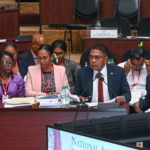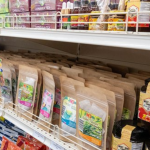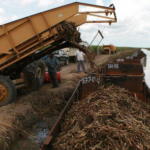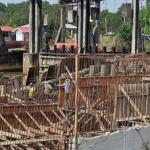The National Agricultural Research and Extension Institute (NAREI) has reached out to farmers of Hague Backdam, a farming community situated on the West Coast Demerara. Crops grown there for commercial purposes are sweet potato, cassava, plantain, pepper, cabbage, spinach, tomato, coconut, ochro, bora among other cash crops.
Chairman of the National Agricultural Research and Extension Institute (NAREI) Board, Major General (Rtd) Joseph Singh; and Chief Executive Officer of NAREI, Dr. Oudho Homenauth recently engaged farmers. Region Three Executive Officer Dennis Jaikarran and Managing Director of the Guyana Foundation Anthony Autar were also part of the interaction.
The meeting was facilitated by the Guyana Foundation, a Non-Governmental Organization that is working to enhance the lives of residents of Hague Backdam. The NGO, headed by Supriya Singh-Bodden,CCH, is currently executing The Hague Back Village Renewal Project. Critical to this renewal project is a vibrant agricultural sector.
The objectives of the meeting were to strengthen the relationship between NAREI and farmers; establish a link between NAREI, the NGO and farmers; and ascertain areas in which the institute could assist farmers. It is important to note that NAREI’s Extension Staff frequently visit the community to provide technical support to farmers.
According to Dr. Homenauth, information regarding the services offered by NAREI could be accessed online, via telephone, and through Extension Staff, who are present in each Region. In addition to providing technical support, quarantining import and exports and offering free soil testing, NAREI tries to link farmers to exporters and processors.
Dr. Homenauth advised the farmers to diversify their crops and include those that have high market value for example red beans. He explained that the smallness of the local market limits the consumption of a particular produce resulting in a large quantity of produces being spoilt daily.
Whilst acknowledging that farmers face the challenge of low prices for some produces such as pepper, he posited that farmers should enter into contractual agreements with exporters and processors as a safeguard.
Dr. Homenauth assured farmers that NAREI wants to help them. However, they need to start approaching their farming activities as a business. For instance, they could invest in shaded cultivation which allows farming all year round. He also encouraged the farmers to utilize the services offered by NAREI such as on the spot soil testing.
The power of working as a collective was emphasized by Mr. Singh, who encouraged the farmers to form a Farmers’ Association. Through a Farmers’ Association farmers could advocate for developmental projects, enter into economic ventures and even negotiate for better prices for produces. In short, organised groups allow persons to counteract challenges.
Mr. Singh related that the Hauraruni Friendly Farmers Society,Soesdyke/Linden Highway, cultivates pepper on a large scale. The peppers are supplied to a processor company that exports products to Jamaica.
He advised the farmers to have a planned approach to farming. “Do not plant because you were planting a particular crop all the time…there are new crops on the market such as sijan, which has high nutritional value,” he said.
Owing to Guyana’s population it is important that produce or processed products are exported to other CARICOM countries. As such, farmers need to start adding value to their produce. For instance, solar drying is an inexpensive method that could help preserve some produce such as pepper and carambola.




